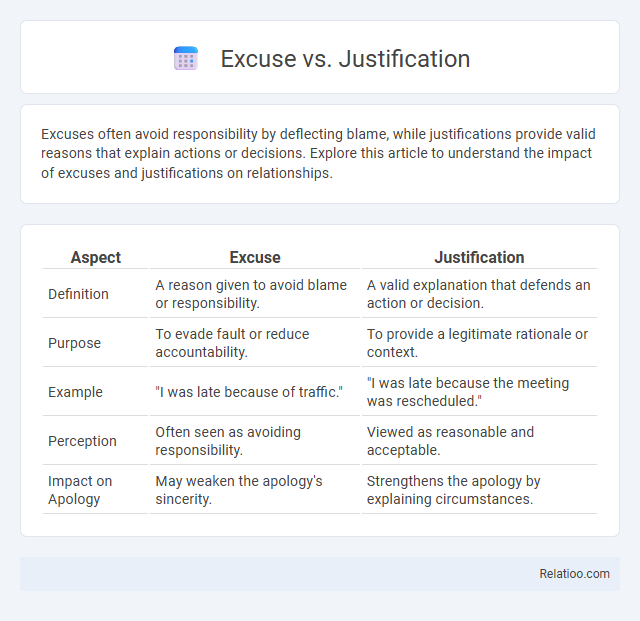Excuses often avoid responsibility by deflecting blame, while justifications provide valid reasons that explain actions or decisions. Explore this article to understand the impact of excuses and justifications on relationships.
Table of Comparison
| Aspect | Excuse | Justification |
|---|---|---|
| Definition | A reason given to avoid blame or responsibility. | A valid explanation that defends an action or decision. |
| Purpose | To evade fault or reduce accountability. | To provide a legitimate rationale or context. |
| Example | "I was late because of traffic." | "I was late because the meeting was rescheduled." |
| Perception | Often seen as avoiding responsibility. | Viewed as reasonable and acceptable. |
| Impact on Apology | May weaken the apology's sincerity. | Strengthens the apology by explaining circumstances. |
Understanding Excuses: Definition and Examples
Excuses are statements or reasons offered to explain or defend a fault or offense, often highlighting external factors that mitigate personal responsibility. Unlike justifications, which admit the act but argue it was right under the circumstances, excuses acknowledge the wrongdoing but seek to lessen blame by citing lack of intent or control. Common examples include attributing tardiness to unforeseen traffic or attributing poor performance to illness, both aiming to reduce culpability without denying the action.
What is a Justification? Key Concepts
A justification is a legal or moral reason that validates an action deemed wrong under normal circumstances by demonstrating it was necessary or appropriate in a specific context. Key concepts include the presence of a lawful or acceptable purpose, such as self-defense or necessity, which negates the wrongfulness of the act. Unlike an excuse, a justification acknowledges the act but denies its illegality or blameworthiness due to overriding circumstances.
Excuse vs Justification: Core Differences
Excuse and justification represent distinct legal and moral concepts, where an excuse acknowledges wrongdoing but argues the actor should not be held fully responsible due to mitigating circumstances, such as insanity or duress. Justification, conversely, asserts that the act itself was right or lawful under the circumstances, like self-defense or necessity, thereby negating the wrongfulness of the conduct. Understanding the core differences between excuse and justification is crucial for determining culpability and appropriate legal outcomes in criminal and civil cases.
Psychological Roots of Excuses
Excuses often stem from psychological mechanisms like defense and self-preservation, where individuals avoid guilt by attributing negative outcomes to external factors. Justifications, unlike excuses, involve rationalizing actions to align with moral or social standards, reducing perceived culpability. Culpability centers on accountability and responsibility, reflecting the degree of moral or legal blame assigned based on intention and awareness.
Social Functions of Justifications
Justifications serve a critical social function by providing reasons that acknowledge responsibility while mitigating blame, differentiating them from mere excuses that deny fault and culpability, which assigns blame and moral accountability. In social interactions, justifications help maintain trust and cooperation by explaining actions in a way that aligns with shared norms and values, often reducing conflict and promoting reconciliation. This mechanism supports social cohesion by allowing individuals to navigate accountability without complete reputational damage.
Ethical Implications: Excuse or Justify?
Excuses often aim to mitigate personal responsibility by explaining behavior without fully endorsing it, while justifications assert that actions were appropriate or necessary under the circumstances. Ethical evaluation distinguishes between excuse and justification by assessing whether the act aligns with moral standards or merely reduces blameworthiness. Understanding culpability involves determining if the individual's motives and context ethically excuse the behavior or if accountability remains warranted.
Impact on Accountability and Responsibility
Excuses often diminish your accountability by providing reasons to lessen perceived fault, whereas justifications acknowledge actions but argue they were appropriate under the circumstances, balancing responsibility and understanding. Culpability directly assigns blame and reinforces the need for accountability by highlighting moral or legal responsibility for the actions taken. Distinguishing between these concepts shapes how responsibility is assessed and influences measures of consequence and learning.
Excuses in Everyday Communication
Excuses in everyday communication serve as explanations individuals use to avoid blame by mitigating responsibility for a particular action or outcome, often appealing to external circumstances or unintentional factors. Unlike justifications, which assert that the behavior was appropriate under the circumstances, excuses acknowledge the behavior as wrongful but seek to reduce culpability by highlighting lack of intent or control. Understanding how excuses differ from justification and culpability can enhance Your ability to interpret motives and responses accurately in social interactions, improving communication effectiveness.
Justifications in Legal and Moral Contexts
Justifications in legal and moral contexts serve as valid reasons that excuse an act otherwise deemed wrongful, allowing individuals to avoid liability or blame. In law, justifications such as self-defense or necessity acknowledge the act but deem it permissible under specific circumstances, distinguishing them from mere excuses that admit fault but seek mitigation. Morally, justifications align actions with ethical norms by providing legitimate grounds for behavior, reflecting societal values and influencing judgments on culpability and accountability.
Choosing the Right Approach: Excuse or Justification
Choosing between excuse and justification hinges on understanding each concept's legal and moral implications: an excuse acknowledges wrongdoing but denies culpability due to circumstances, while justification accepts the act as lawful or appropriate under the situation. For example, self-defense serves as a classic justification because the act is considered acceptable to prevent harm, whereas insanity is an excuse that negates responsibility despite the act being wrong. Selecting the right approach depends on evaluating the defendant's intent, context, and the ethical framework surrounding the act, crucial for accurate legal outcomes.

Infographic: Excuse vs Justification
 relatioo.com
relatioo.com